When I watch a golf tournament on television, I am disappointed if the finishing holes do not provide high drama. The best of them - Harbourtown and Pebble Beach come to mind - make even a two-stroke lead a little tenuous. Everything from the drive to that last three-foot putt should have players and viewers holding their breath.
I haven't played any U.S. Open courses this year, although I did play one that hosted the 1974 PGA Championship (Tanglewood), but I still looked for a little drama on the finishing holes I encountered. Here are three that stood out for me. Interestingly, none of these courses I feature today are in housing developments, but nice homes are available within a mile. I'll follow up with a few more fantastic finishers tomorrow.
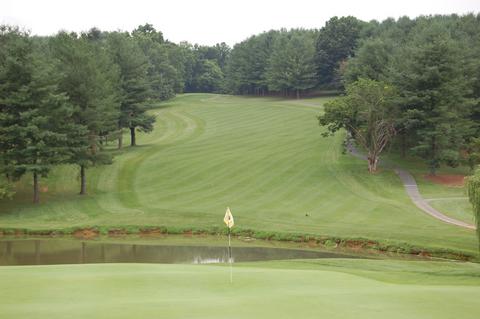
The finishing hole at Lexington Golf Club in Virginia may be out of character with the relatively easy rest of the course, but it has everything a great finisher should have.
Lexington Golf Club, Lexington, VA
In April, on a visit to Washington & Lee University where my son Tim decided to enroll, we played the private Lexington Golf Club. At 6,444 yards from the tips, a course rating of 71.4 and slope of 125, Lexington isn't a long or tough course by any means, but the 18th on the Ellis Maples layout is mean. A 400-yard par 4, the landing area off the tee is generous, but the approach is a knee-knocker, all carry over water to an elevated green with a very false front and guarded in the middle by a yawning bunker. The green arcs around the trap, and the putting surface slopes from the back right toward the bunker. Front pin positions are especially treacherous; you have Hobson's choice of either toying with the slope in front of the green or hitting past and leaving yourself a tricky and slick downhill putt or chip shot. The choice, especially during a competition, makes for a bit of drama. Lexington's 18th is out of character with the rest of the course, but not with the roster of classic finishing holes.
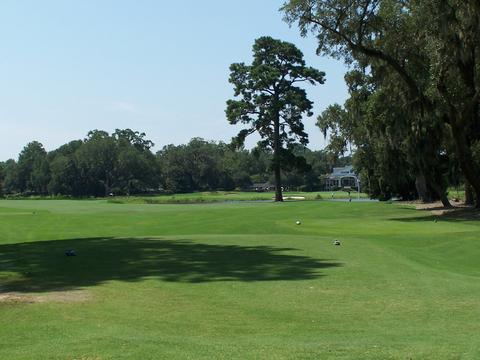
The most direct line to the green is a tee ball down the right side at Caledonia's finishing hole, but that also could be the path to doom if you push your shot just a little.
Caledonia Golf & Fish Club, Pawleys Island, SC
Caledonia Golf & Fish Club, whose reputation and green fees have escalated in tandem in recent years, is a beautifully sculpted Mike Strantz course that is rarely taxing. Position the ball well onto the generous fairways and a good score is more than possible. The 18th, however, can ruin your day if you relax on the tee box. From the tee, a typically wide Caledonia fairway spreads before you until about 240 yards out, where a lake encroaches from the right. Those protecting a good score will play it safe to the left of the hazard, but that leaves a medium or longer iron into the difficult, 40-yard long green. Taking a chance down the right with a 3-wood or driver leaves a seven iron or less and a much easier approach, especially to a back right pin, but even a slight push could mean double trouble - a penalty stroke plus a long approach. Otherwise, the second shot is all carry over the water to a long and narrow spit of green; hit short when the pin is at rear and you could have a putt of up to 90 feet. As you stand in the fairway sizing up your options, you may wish you were already among those sitting on the clubhouse deck, overlooking the green, ready to cheer or jeer.
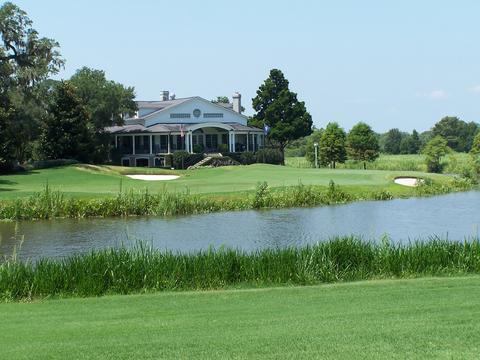
The last shot from a fairway at Caledonia is appropriately scary, if you negotiate the tricky tee shot.
Tanglewood Championship Course, Clemmons, NC
The par 4 18th at Tanglewood's Championship Course in Clemmons, NC, is a straight uphill, dogleg right brute that requires a drive placed past a bunker at the corner of the fairway. Then the fun begins with a long uphill iron shot to a well-guarded and elevated green in front of the clubhouse. Pulled shots have a chance to clear a fence and bound into a parking lot, out of bounds. As tough as the 18th is, it is not as difficult as #9, another uphill par 4 that served as the finishing hole in the 1974 PGA Championship and the scene of Lee Trevino's one-stroke victory over Jack Nicklaus. Its green is perched on a hill with trouble all around; bogey is easier to make there than at today's 18th, although both fill the bill as outstanding finishers.
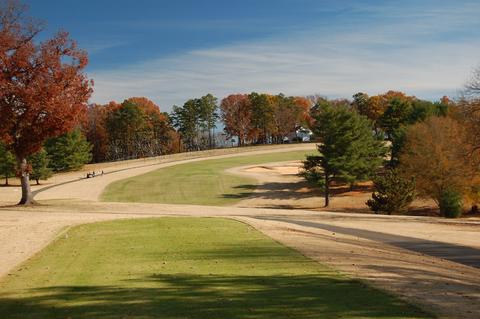
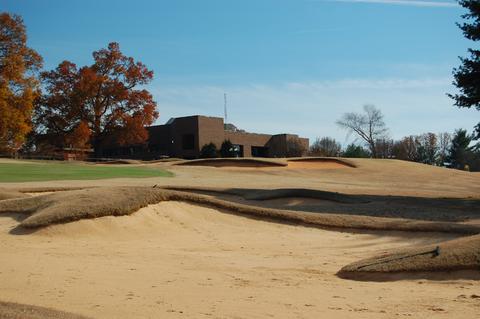
The 18th at Tanglewood (above) provides a thinking man's tee ball. A shot near the bunker on the right leaves the shortest path to the green, but one that must clear some dastardly bunkers (bottom photo). From the left, the shot is longer, still uphill, but with a better entrance to the green.
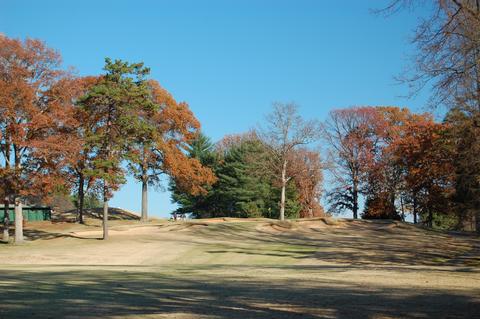
The 9th at Tanglewood was played as the 18th at the 1974 PGA Championship. It is the tougher finishing hole.























